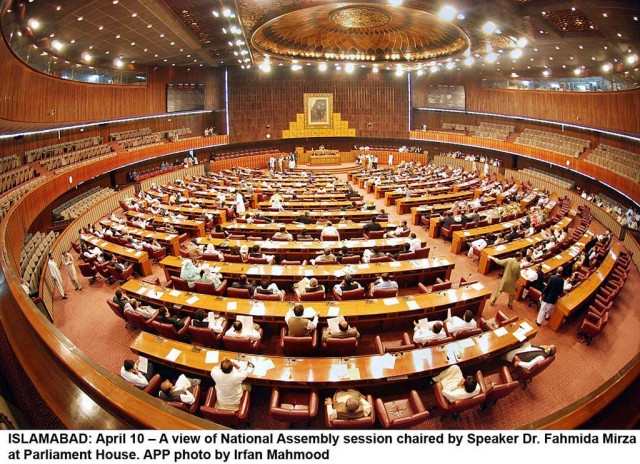NA extends CPEC authority ordinance for 120 days
Opposition stages walkout; says parliament is not meant to endorse ordinances

National Assembly of Pakistan. PHOTO: APP
When the government on Thursday introduced the CPEC Authority Ordinance, 2019 and Tax Laws (Second Amendment) Ordinance 2019 for an extension in the National Assembly, the opposition strongly protested.
Former prime minister and the PPP leader Raja Pervaiz Ashraf said a meeting of the National Assembly has been convened in haste to pass the ordinances. “We are not here to endorse ordinance [the purpose of the parliament is to make law,” he said.
Minister of State for Parliamentary Affairs Ali Muhammad Khan said extension of the ordinances was necessary because time was running out. “Amendments to the relevant bills will be made only in consultation with the opposition,” he assured.
The house later extended both the ordinances for 120 days.
Through the CPEC Authority Ordinance, promulgated by the president on October 8, 2019, a 10-member CPEC Authority has been established with the task to expedite projects related to the multi-billion dollar road and rail network that links China to Arabian Sea through Pakistan.
The authority will find new drivers of economic growth, and unlock the potential of interlinked production network and global value chains through regional and global connectivity.
The Tax Laws (Amendment) Ordinance, 2019 promulgated on October 6, 2-19 seeks to amend certain laws including the Customs Act, 1969 (Act IV of 1969) and the Sales Tax Act, 1990.
According to Article 89 of the Constitution, the president can promulgate an ordinance when the Senate or the National Assembly is not in session – in order to tackle some emergency situation.
The ordinance has the same force and effect as an act of the parliament but it stands repealed at expiration of 120 days from its promulgation if it is not given another extension of another 120 days prior to its expiry. An ordinance cannot be given a second extension.
The PTI government, which does not enjoy majority in the Senate – the upper house of the parliament – has introduced a number of presidential ordinances in its one-and-a-half-year tenure. The opposition criticizes this reliance on ordinances and accuses the government of undermining the parliament.
Crackdown against PTM
Taking the floor, MNA Mohsin Dawar – an independent lawmaker from former tribal areas – strongly criticized the federal government over arrest of Manzoor Pashteen, the head of the Pashtun Tahafuz Movement (PTM), and registration of cases against the protesters.
Pashteen was arrested and subsequently sent to jail on 14-day remand by a judicial magistrate in Peshawar on Monday. Police arrested Pashteen from Peshawar’s Shaheen Town on the basis of an FIR registered against him on Jan 18 in DI Khan on a slew of charges.
Earlier, MNA Imran Khattak spoke about Nowshera's tragedy and demanded that perpetrator of child abuse should be hanged publicly. “Such people were stoned to death in he state of Madina.”
Ali Mohammad Khan said that the prime minister himself said in the cabinet that the accused of child abuse should be hanged. The meeting was later adjourned till today (Friday).



















COMMENTS
Comments are moderated and generally will be posted if they are on-topic and not abusive.
For more information, please see our Comments FAQ